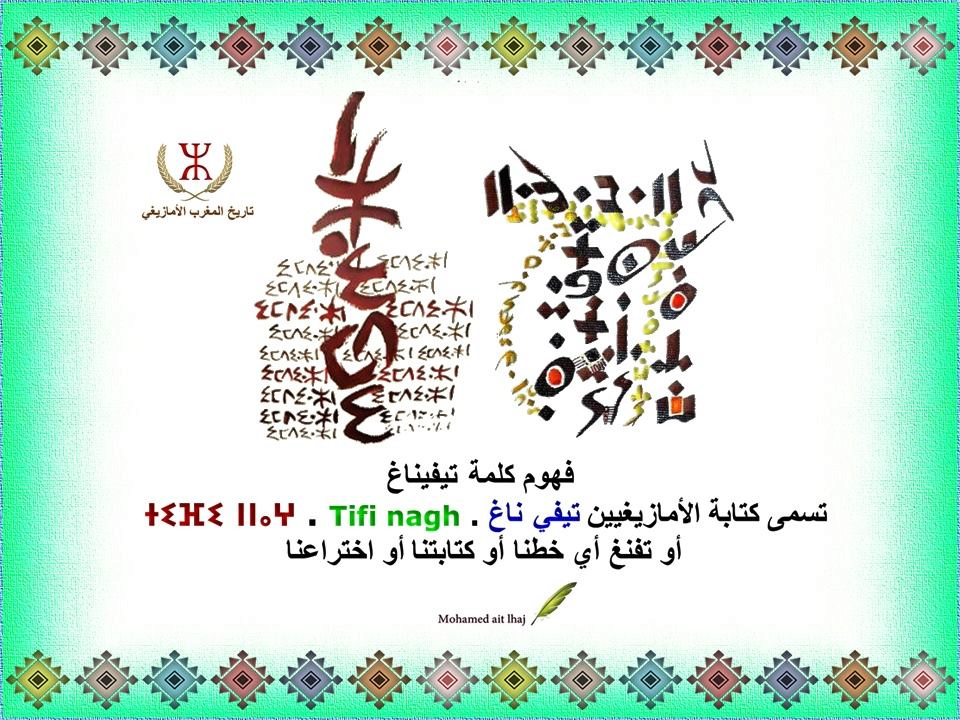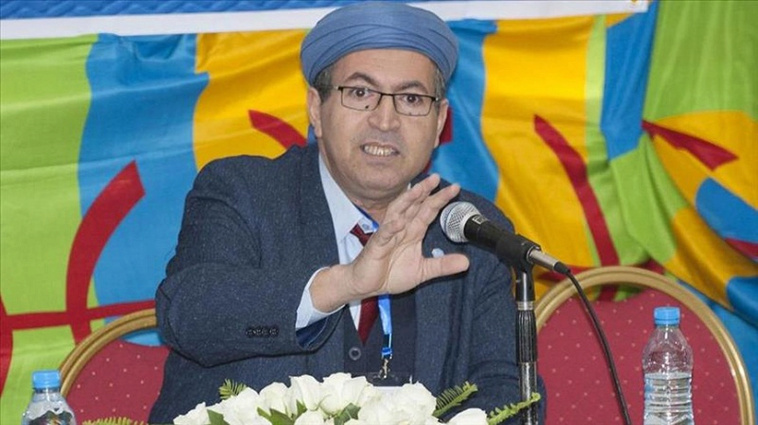The International Amazigh Assembly accuses the institutions supervising the community of “racial discrimination” against “Tifinagh” education

The International Amazigh Assembly called on those in charge of the affairs of the Moroccan community residing abroad to respond to the directives of King Mohammed VI in many of his speeches calling for modernizing and rehabilitating the institutional framework for Moroccans around the world, especially with regard to “the continued discrimination against the Amazigh members of the community,” calling on them to submit their resignations in the event of their subsequent failure. To “considerations related to their ideological orientations,” according to him.
The head of the World Amazigh Community, Rachid Rakha, sent a message about “the continued discrimination against Amazigh members of the Moroccan community abroad,” on the occasion of National Migrants’ Day, which falls on August 10, to Nasser Bourita, Minister of Foreign Affairs, African Cooperation and Moroccans Residing Abroad, and Chakib Benmoussa, Minister of Foreign Affairs. National education, primary education and sports, Omar Aziman, President of the Hassan II Foundation for Moroccans Living Abroad, Abderrahmane Ezzahi, Secretary General of the Hassan II Foundation for Moroccans Living Abroad, Idriss El Yazmi, President of the Council of the Moroccan Community Abroad and Abdallah Boussouf, Secretary-General of the Council of the Moroccan Community Abroad.
The World Amazigh Assembly called on the institutions concerned with community affairs to be “serious” in dealing with this important file related to teaching the Amazigh language and culture to the children of Moroccan citizens residing abroad, “in respect of the requirements of the constitution, the regulatory law and the royal will,” stressing that if this file is not dealt with With the required seriousness, “You must admit and acknowledge your inability to manage this file due to considerations related to your ideological orientations, and therefore submit your resignations to make room for other personalities who are more open and more respectful of the Moroccan constitution and laws, and personalities imbued with the values of pluralism, diversity and democracy.”
The letter recorded the absence of “any tangible change within the various institutions concerned with the community, and that they did not interact with the royal will contained in the text of the king’s speech on the 69th anniversary of the King and the People’s Revolution,” stressing that “we did not sense any will on the part of any of your institutions to deal with the Amazigh language, the language.” “The official status of the state and the public domain of all Moroccans. On the contrary, your institutions have demonstrated a miserable failure in implementing what His Majesty the King wanted, and thus your inability to perform your duties as you should. We mention here in particular the continued incomprehensible discrimination against the Amazigh identity of the Moroccan community abroad.” .

The correspondent recalled what was stated in the King’s speech on the 69th anniversary of the Revolution of the King and the People, in which he addressed a speech in which he called for “modernizing and rehabilitating the institutional framework of the Moroccan community residing abroad, and reconsidering the governance model of existing institutions, with the aim of increasing their effectiveness and integration.” He added: “We must constantly ask: What have we provided for them to strengthen this connection to the homeland? Do the legislative framework and public policies take into account their privacy? Are the administrative procedures appropriate to their circumstances? Have we provided them with the necessary religious and educational supervision?”, stressing that “public policies must be in the interest of this group and devote strong support to them by creating a special mechanism whose mission is to keep pace with Moroccan competencies and talents abroad, and to support their initiatives and projects.”
The letter asked why these institutions, a year after this royal speech and despite all the correspondence sent by the Amazigh Assembly, “continue to exclude the teaching of the Amazigh language to the children of Moroccan citizens residing abroad, even though, on every occasion, they do not hesitate to remind that the Amazigh language... Common property for all Moroccans without exception.”
The World Amazigh Assembly inquired about “the reasons for the continued disregard for the constitution, the law, and the royal speeches in which His Majesty the King focused on the Amazigh language, from the historic speech of Ajdir until the recognition of the Amazigh New Year as an official holiday for all Moroccans,” stressing that “today we have the right to question the fate of the royal speeches and to modernize and rehabilitate them.” The institutional framework of the Moroccan community abroad, and whether the governance model of existing institutions has actually been reviewed with the aim of increasing their effectiveness and integration?

The letter indicated that the Amazigh Assembly “sent, on several occasions, letters to the Minister of National Education and to various similar institutions regarding teaching Amazigh to children of Moroccans abroad,” and drew “the attention of the Minister of National Education more than once to the Ministry’s complete neglect of teaching the Amazigh language to children of the Moroccan community abroad.” It is a deliberate step that reflects racial discrimination that completely contradicts the spirit of the Constitution of July 1, 2011, the contents of Article 5 thereof, and the objectives of Organic Law No. 16-26 relating to determining the stages of activating the official nature of the Amazigh language and the methods of integrating it in the field of education and in priority areas of public life,” he stressed. “This is being done in flagrant violation of Articles 7 and 8 of the International Convention on the Rights of the Child and recommendations issued by UNESCO and the World Bank on the importance of the mother tongue in children’s education.”
In this regard, he recalled that “the Special Rapporteur on contemporary forms of racism, racial discrimination, xenophobia and related intolerance, Tendayi Ashwini, who arrived in Morocco in November 2018, confirmed the continued discrimination against the Amazigh because of their language and culture.” Accordingly, the recommendation in turn renewed the call on the Kingdom of Morocco to intensify its efforts to ensure that the Amazigh are not subjected to racial discrimination in exercising their fundamental rights, especially with regard to education.”
The group expressed its surprise “at the complete exclusion of Amazigh culture and language,” considering that “the continued ratification of laws, decisions, and projects related to Moroccan languages and culture related to immigrants, in parallel with the complete exclusion of the Amazigh language, clearly represents discrimination and racism against the language and culture of millions of Moroccans, inside and outside Morocco,” noting that “The vast majority of members of the Moroccan community residing in various European countries and in the world are of Amazigh and Amazighphone origins.”
He also stated that King Mohammed VI “confirmed, on the occasion of the decision to recognize the Amazigh year, that: Amazigh is a major component of the authentic Moroccan identity, rich in its many tributaries, and a common asset for all Moroccans without exception.”

The correspondent pointed out that the King, in his last speech to the nation on the occasion of the twenty-fourth anniversary of his accession to the throne, stressed the importance of seriousness, sincerity and dedication to work in order to enable the Kingdom to achieve many achievements and overcome various difficulties, calling for “seriousness in political, administrative and judicial life through serving the citizen.” Choosing qualified competencies, giving priority to the best interests of the nation and citizens, and abstaining from bidding and narrow calculations.”
Source: websites

